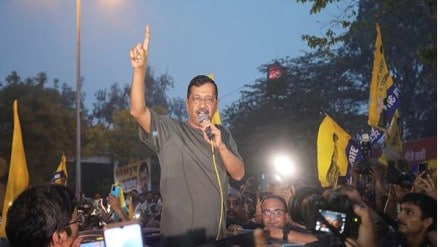The Supreme Court on Friday granted bail to Delhi Chief Minister Arvind Kejriwal in the CBI case related to corruption allegations surrounding the scrapped Delhi excise policy of 2021-22.
A bench of Justices Surya Kant and Ujjal Bhuyan has granted bail to Aam Aadmi Party (AAP) leader Arvind Kejriwal, noting that the trial is unlikely to conclude soon. The court determined that Kejriwal meets the triple test criteria for bail, leading to his release.
While granting bail, the court made it clear that Kejriwal does not need to approach the trial court for further bail conditions.
“We are not relegating the appellant to the trial court,” it said while granting bail to Kejriwal.
However, it also directed that Kejriwal should refrain from making public comments about the case due to the ongoing public narrative. He is required to attend all hearings before the trial court unless specifically exempted from appearing in person.
Timeline of key developments in Arvind Kejriwal’s excise policy case:
March 21, 2024:
Arvind Kejriwal was arrested by the Enforcement Directorate (ED), becoming the first sitting Chief Minister to be taken into custody by the agency. The arrest was linked to a money laundering case involving alleged kickbacks received by the Aam Aadmi Party (AAP) and its leaders in the now-scrapped 2021-22 Delhi excise policy.
May 10, 2024:
Ahead of the general elections, the Supreme Court granted Kejriwal interim bail until June 1, the date of the final phase of voting in the Lok Sabha elections. The Court cited the importance of elections as a “barometer and lifeline of a parliamentary system” and highlighted Kejriwal’s clean record and the absence of any criminal background.
June 2, 2024:
Kejriwal surrendered at Tihar Jail a day after his interim bail expired, in compliance with the Supreme Court’s conditions related to the excise policy case.
June 26, 2024:
The Central Bureau of Investigation (CBI) formally arrested Kejriwal in the corruption case linked to the alleged excise policy scam. Special Judge Amitabh Rawat of the Rouse Avenue Court authorized the arrest. The CBI focused on proving allegations of corruption and bribery by public officials, while the ED’s case centered on tracking the money trail.
July 12, 2024:
The Supreme Court granted Kejriwal interim bail in the ED case, raising questions about the legality of his initial arrest in March. Despite this, Kejriwal remained in custody due to his arrest in the CBI case related to the same excise policy.
August 5, 2024:
The Delhi High Court upheld the CBI’s decision to arrest Kejriwal and directed him to seek bail from the trial court.
August 12, 2024:
Kejriwal challenged the Delhi High Court’s decision by appealing to the Supreme Court.
September 5, 2024:
The Supreme Court reserved its decision on Kejriwal’s bail plea and his challenge against his arrest by the CBI under the Prevention of Corruption Act, 1988, in connection with the excise policy case.
September 13, 2024:
The Supreme Court granted bail to Arvind Kejriwal in the CBI case, with Justice Kant stipulating that Kejriwal must furnish a bail bond of Rs 10 lakh. The Court also directed him to refrain from making any public statements regarding the case.
